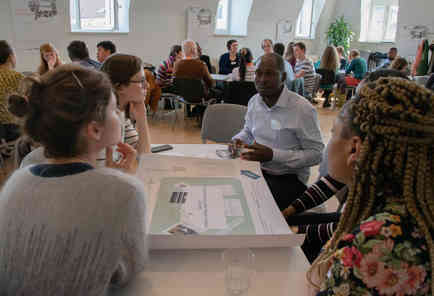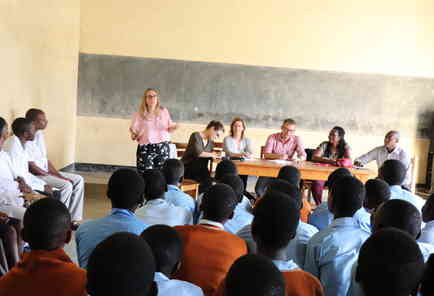Céline Sercu is a teacher educator and pedagogue at Howest University of Applied Science and is committed to internationalisation. In her free time, she enjoys travelling and professionally she seizes every opportunity to look at the world with a mind as open as possible. Together with the eNSPIRED team, she went to Cambodia in preparation for the international learning week on gender: “For me, going abroad means breaking your proverbial glasses and realising that your way of looking is coloured by your own experiences and pre-knowledge. This is exactly what we also try to impart the teachers of tomorrow at Howest.’’
The added value of internationalisation
As a member of the eNSPIRED working group on gender, this academic year Céline is making her contribution to the content of the programme. She, therefore, grasped the opportunity to discover Cambodia together with the team in preparation for the learning week. “As a student, I didn't get the chance to go abroad. I am therefore very happy that thanks to my job, I can now gain the added value of such international experiences myself. By sharing my stories with my students, I try to stimulate their commitment to explore new horizons and widen their views. It is always nice when you are able to convince students, and certainly the doubters”, she explains her motivation.
Was a trip abroad in the middle of the academic year not a problem for the study course to which she is connected? “I didn't have to fight very hard to get permission from Howest to accompany you. Maybe my argumentation and enthusiasm worked so contagious they couldn't say 'no'!”, she laughs. “But in terms of content, this mission was of course a perfect addition to my position. I am a member of the eNSPIRED working group and through the internship programme, I regularly come in touch with VVOB. This academic year my commitment increased and I am gradually getting to know how the whole organisation works.”
A confrontational educational reality
“I had never been to Cambodia and the unknown always attracts me.” As a seasoned globetrotter, there was no question of a culture shock for Céline, who has already set foot on the Asian continent several times. “I leave with an open mind, so deliberately do not prepare myself too much for a trip and like to let myself be surprised on the spot. From a professional point of view, I did read literature about education in Cambodia and the influence of the Khmer Rouge regime in the 1970s on the (current) education system.’’
The country and the educational reality on the spot impressed her a lot: “I was very moved by the history of Cambodia. The terror that sowed the Khmer Rouge is still alive among both the young and older generations.” In 1975, the communist Khmer Rouge movement seized power. Following the example of Mao Zedong, leader Pol Pot aimed for an agricultural society, without foreign interference. Cities were evacuated and all residents had to work in collective farms. Those who had studied were considered a threat to the regime and were silenced. Countless intellectuals, teachers, monks, doctors, soldiers and officials were judged and executed. In total, one and a half to two million inhabitants died.
Scars from a reign of terror
“More than ever I have realised how hard the politics of a country determine the reality in which you live and how lucky you are to be where you are born. There’s a good chance I would not have survived the Pol Pot regime as a teacher educator, which made the experience as an education professional very confronting. Only after the fall of the Khmer Rouge in 1979 could Cambodia rebuild the education system, but that was very difficult without academics, teachers or intellectuals in society. “
Gender regulations as a guideline
“In addition, I am shocked by the gender norms that live in the country. The Chbab Srey and Chbab Proh are still used today and are deeply rooted in society’’, Céline points out one of the gender challenges in the country. The Chbab Srey and Proh are prescriptions of how girls and boys should behave respectively. These rules of conduct are steeped in gender stereotypes and have been embedded in the country's curriculum and culture for generations. "Even though these reference works are no longer taught, you notice they are often referred to both at home and at school," Céline shares her experiences. “The book is steeped in gender stereotype expressions, such as 'girls have shorter legs'. That is a disguise of a gender-stereotypical message because the shorter legs here symbolize the assumption that girls should stay closer to their homes and be allowed to bear fewer responsibilities.’’
Still a long way to go
The way Cambodians evaluate their education system was not unnoticed by Céline: “While our focus is on content, you notice that schools in Cambodia are currently exclusively focusing on the number of pupils present. They are counted every day, with particular attention to the number of girls who find their way to the school desks. In order to break gender roles, involving girls is, of course, the first step.”. According to Céline, the TIGER programme that VVOB is rolling out is an important contribution here. “You notice how TIGER is gradually changing the attitude towards gender roles, but gender stereotypes are so interwoven in all layers of society that it will be a long-term job. The Action Guide, a handbook to be more gender-responsive in front of the class, is a major step forward. The programme does not only include educational actors. Through Gender Cafés and Men Dialogues, the communities around the schools are also actively involved in discussions about gender and gender roles.”
The power of eNSPIRED
The deep impression the trip left on Céline confirms the power of internationalisation and eNSPIRED. "In fact, everyone should jump on a plane and taste the educational reality on the spot, but that is of course not feasible," Céline realises. “That is precisely where the power of eNSPIRED and more specifically the learning week lies. Without having to relocate yourself to a country on another continent, the programme brings international educational experts to Belgium. You can hear their story first-hand and find out how they personally deal with educational challenges. They come here to tell their story themselves and share how they experience problems, approach them and implement solutions. Its added value is invaluable for the education sector. "

